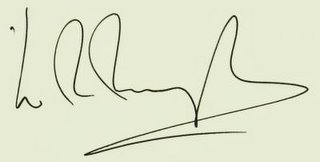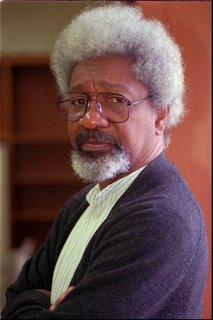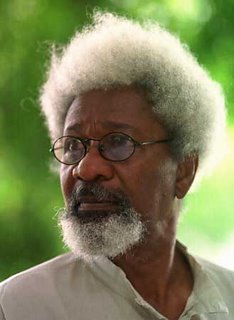
Wole Soyinka on supressed Cultures/Religion and the unhelful west/east devide
Autor:
Rafał Gadomski
0
komentarze
![]()
A watercolour paint of Wole Soyinka.
This beautiful watercolur was created by Ajilo John T.(AjiloArts):
Autor:
Rafał Gadomski
1 komentarze
![]()
Studies of work and language of Wole Soyinka
"A Dramatic Life" (J.D. Thomas)"Crisis of representation in Wole Soyinka's Season of Anomy" (Meditations Journal)
"In defence of The Interpreters" (Amina Maikori)
"Kongi and temporal power" (A. Maja-Pearce)"Kongi's Harvest film reference" (Jo-Ko)
"Kongi's Harvest of Intrigue and Hate" (A.E. Smith)
"The drama and the theathre of Wole Soyinka" (Rasheed Abiodun Musa)
"The Educational Theory of Wole Soyinka" (Ch. Nnajiofor)
"The Essential Soyinka" (Uzor Maxim Uzoatu)
"Wole Soyinka's 'Blues for a Prodigal': A Review" (D. Adelugba)
"WOLE SOYINKA: Politics, Poetics, and Postcolonialism" (B. Jeifo)
"Week 10: Telephone Conversation by Wole Soyinka" (World Literature)
Autor:
Rafał Gadomski
0
komentarze
![]()
Another sites about Wole Soyinka
Academy of Achievement
Answers.comBabyNamerEncyclopedia Britannica OnlineEncyclopedia of World Biography
Guardian Unlimited
Kituo cha katiba
New York State Writers Institute
PDF eBooks
PDF Search engine
Stanford Presidential Lectures
Autor:
Rafał Gadomski
1 komentarze
![]()
Articles about Wole Soyinka
"State of the Bully" (10.1996)
"Truth and Reconciliation" (01.1999)
"Fellow of the world" (08.2002)
"Nobel Winner on Survival" (11.2004)
"The voice of conscience" (05.2007)
"Serious case of activism" (06.2007)"Maja-Pearce on Kongi" (07.2007)
"The Literery Lion" (07.2007)
"Soyinka accuses West of destroying other nations" (07.2007)
"Nigerian Nobel laureate draws crowds at Berlin lit fest" (09.2007)
"Watching Wole's return to Biafra" (10.2007)
"Nigeria: Appraisal of Democracy - Soyinka Decries Reign of Impunity" (12.2007)
"Nigeria: Soyinka, Gani Condemn Ribadu's Ouster" (12.2007)
"Nigeria: How Obasanjo Misled UNESCO over Presidential Library - Soyinka" (03.2008)
"Nigeria: Soyinka to Drag Obasanjo to Court Over Library" (08.2008)
"Bury me in Abeokuta, says Soyinka" (08.2008)
"Soyinka traces origin of Boko Haram" (09.2009)
"Nobel winner Soyinka charms, chased for autographs" (01.2010)
"Soyinka: Engaging the African World" (01.2010)
"I was shocked to win Nobel, says Wole Soyinka" (o2.2010)
"Wole Soyinka, Nigerian Media and the Edo Rally" (06.2010)
Autor:
Rafał Gadomski
2
komentarze
![]()
Lectures and articles by Wole Soyinka
"2007 Elections and the Gang of Four"
"A Year of Rapid Reverses"
"Changing Attitudes and Behaviors: The Role of Africa's Cultural..." (audio)
"Conference by Wole Soyinka"
"The Isle of Polyphemus"
"Towards a Sustainable Vision of Nigeria"
UNESCO: "Dialogue among civilizations"
"WS on Receiving the Fonlon-Nichols Award (2000)"
"The Rights and Obligations of Union Membership"
Autor:
Rafał Gadomski
2
komentarze
![]()
Interviews with Wole Soyinka
Academy of Achievement: "Voice for human rights, democracy and freedom" (audio, video)
BBC World Book Club: "Ake: The Years of Childhood" (audio)
BBC Hard Talk with Stephen Sackur (video)
Coucil for Secular Humanism: "Why I Am a Secular Humanist"
Democracy Now: "Darfur Crisis: A Blot on the Conscience of the World" (video)
Democracy Now: "On Oil in the Niger Delta, the Effect of Iraq on Africa and His
Frontline World: "Thoughts of a Favourite Son"
iRead: "Wole Soyinka on India, literature and politics" (search: March, 2010)
Mother Jones: "Wole Soyinka, master of disguise"
New Memoir" (audio)
Open Democracy
The Hindu: "The Language of Exile"
The New Gong Magazine: "Conversation with Wole Soyinka"
Time: "10 questions for Wole Soyinka"
The Root: "Africa since 1960"
"Wichaar.com: "Interview with Wole Soyinka"
Autor:
Rafał Gadomski
0
komentarze
![]()
Soyinka's Nobel
Nobel lecture, interview, poetry, and more...
Link
Autor:
Rafał Gadomski
0
komentarze
![]()
Biography
About year 1940, after attending St. Peters Primary School, Soyinka goes to Abeokuta Grammar School, were he wins several prizes for composition. In 1946 he is accepted by Government College in Ibadan, at that time Nigeria’s most elite secondary school. Upon completion of his studies at college Soyinka moves to Lagos, were he finds employment as a clerk. During this period of time he writes some radio plays and short stories that are broadcasted by Nigerian radio. After finishing his course in 1952, Soyinka begins studies at University College in Ibadan, a school connected with University of London. During this course he studies English literature, Greek, and Western history. In the year 1953-1954, his second and the last at University College in Ibadan before moving to Leeds in England, he works as an editor for “The Eagle”, a non frequent periodical of humorous character. On the second page of this journal, he writes commentaries about academic life, often criticizing stingingly his collegues students, and many times courteously defends affronted and insulted female colleagues. Then he writes his first publication, a short radio broadcast for Nigerian Broadcasting Service National Programme called "Keffi's Birthday Threat", which is being broadcasted in July 1954 by Nigerian Radio Times.
In 1954 Soyinka moves to England, were he begins studies in English literature, under the supervision of his mentor Wilson Knight. He becomes acquainted then with a number of young, gifted British writers. Before defending his M.A., young Soyinka successfully engages in literary fiction, (at that time he publishes several pieces of comedic nature). After that, he stays in Leeds with an intention of earning a doctorate. Influenced by his promoter, Soyinka decides to merge European theatrical traditions, with those of Yoruba people. In 1958 emerges his first major play, entitled “The Swamp Dwellers”. One year later he writes “The Lion and The Jewel”, a comedy which arouses an interest in several members of London Royal Court Theatre. Encouraged Soyinka, leaves his doctoral studies and moves to London, where he works as play reader for Royal Court Theatre. At the same time, both his plays are displayed in Ibadan.
In 1960, awarded with Rockefeller Research Fellowship, Soyinka returns to Nigeria. In March he produces in Ibadan his new satire “The Trials of Brother Jero”, which establishes his fame as Nigeria’s foremost dramatist. His play “A Dance of The Forest” wins a contest for official play for Nigerian Independence Day and on 1st October has its premiere in Lagos. Soyinka establishes an amateur ensemble acting company Nineteen-Sixty Masks. With the money gained from Rockefeller Foundation for research on African theater, he buys a Land Rover and starts traveling across the country as research fellow of Department of English Language of University in Ibadan. In one of the essays published at this time, he criticizes Leopold Sanghore's negritude, as a nostalgic and indiscriminate glorification of the black African past, that ignores the potential benefits of modernization. “A tiger does not shout its tigritude” he declares “it acts”. In December 1962 his essay “Towards a True Theater” is published. In 1962 he begins working for Department of English Language of University in Ife. Soyinka discuses with “negrophiles” and on several occasions, opposes the government censorship. At the end of 1963 emerges his first feature-length movie “Culture in Transition”. In April 1964 his famous novel The Interpreters is brought out in London. In December, together with other scientists and men of theater, he founds Drama Association of Nigeria. This same year he resigns his legacy at the University, as a form of protest against the obligation of political, pro-governmental behavior imposed by the University's authorities. Few months after that, he gets arrested for the first time, accused of underlying tapes during reproduction of recorded speech of the winner of Nigerian elections, but he gets released after a few months lockup, as a result of protests of international community of writers. This same year he also writes two more dramatic pieces: “Before the Blackout” and the comedy “Kongi’s Harvest”, and a radio play for London BBC called “The Detainee”. At the end of that same year Wole Soyinka gets promoted headmaster and senior lecturer in Department of English Language at the Lagos University. In his political speeches at that time, he criticizes on several occasions the cult of personality, government corruption, and the African dictatorships. April 1965 brings a revival of his play “Kongi’s Harvest” on I International Festival of Negro Art in Dakar, where another of his plays “The Road” is awarded the Grand Prix. In June Soyinka produces his play “The Lion and The Jewel” for Hampstead Theatre Club in London. Year 1967 is the year of severe political tensions in Nigeria.
In May begins The Biafran War, with the aim to separate reach in oil Biafra Region, populated mostly by Ibo community, from Nigeria. Soyinka becomes chief of Cathedral of Drama at the University of Ibadan. In August he secretly and unofficially meets Ibo leader Chukuemka Odumwegu Ojukwu in the Nigerian town of Enugu, with the aim to persuade him to stop the actions tending to separate Ibo land from Nigeria. Out of an order of President Gowon, Soyinka is arrested and imprisoned. This same year in September his play “The Lion and The Jewel” is produced in Accra, and in November “The Trials of Brother Jero” and “The Strong Breed” are displayed in Greenwich Mews Theatre in New York. Then also appears a collection of his poetry called Idanre and Other Poems. In 1968, also in New York, the group Negro Ensemble Company shows “Kongi’s Harvest”. Soyinka translates from Yoruba a collection of poems of his compatriot D.O. Fagunwa, called "The Forest of a Thousand Demons: A Hunter's Saga".
In October 1969, when Biafra Secession comes to an end, the amnesty is proclaimed, and Soyinka leaves the walls of his prison. First few months after the release, Soyinka spends on a farm in southern France belonging to one of his friends, where he tries to come round after the period of mental stagnation. There emerges one of his most prominent masterpieces, “The Bacchae of Euripides”. In London appears a tome of his poetry, Poems from Prison. At the end of the year, he returns to his office of Headmaster of Cathedral of Drama in Ibadan, and cooperates in founding of the literary periodical “Black Orpheus”. In 1970 he produces “Kongi’s Harvest”. At the same time a movie with the same title is being produced. In June 1970 he ends another of his plays called “Madman and Specialists”.
With the intention of gaining theatrical experiences, along with the group of fifteen actors of Ibadan University Theater Art Company, he goes on a trip to famous Eugene O’Neil Memorial Theater Centre in New Heaven, Connecticut, where his new play has its premiere. In 1971 appears another of his poetry's collections called A Shuttle in the Crypt. In March “Madmen and Specialists” is exposed afresh in Ibadan. In Paris, in the French movie of Conor’s Cruise O’Brien called “Murderous Angels”, he acts Patrice Lubumba. He also testifies in a process of violation of student's rights. His book The Man Died, a collection of notes from prison is issued the same year.
In April, concerned about political situation in Nigeria, Soyinka resigns his duty at the University in Ibadan, and goes on a few years voluntary exile. In July he shows in Paris some fragments of his famous play “The Dance of The Forests”. In 1972 he's decreed a Honoris Causa doctorate at the University of Leeds, appears another of his novels Season of Anomy, and Oxford University Press issues his Collected Plays 1. This same year National Theater of London, which actually commissioned the play, shows “The Bacchae of Euripides”. In 1973 the plays "Camwood On the Leaves" and "Jero's Metamorphosis" are first published.
During the period of 1973-1975 Soyinka devotes himself, most of all, to scientific activity. He undergoes one year probation in Churchill College in Cambridge University, and gives a series of lectures at some European Universities. In 1974 Collected Plays 2 is issued by Oxford University Press. In 1975 Soyinka is promoted the editor of “Transition” magazine in the capital of Ghana, Accra (where he moves for some time). On the columns of that periodical, he attacks again the “negrophiles” (in his essay “Neo-Tarsanism: The Poetics of Pseudo-Transition”), and the African military regimes (protesting against the military revolt of Idi Amina in Uganda).
After political turnover in Nigeria, and subversion of military government of President Gowon, the same year of 1975, he returns to his homeland and takes command of the Cathedral of Comparative Literature at the University in Ife. In 1976 appears a collection of his poetry Ogun Abibiman, and an essay’s collection Myth, Literature and the African World, in which Soyinka explores the genesis of the mysticism in African theater and, using examples from literatures of both continents, appoints the similarities and the differences between the cultures of Europe and Africa. In the Institute of African Studies at the University of Legon in Ghana, he gives a series of guest lectures. He also graduates as Professor at the University in Ife. In October the French version of “The Dance of The Forests” is displayed in Dakar. In Ife “Death and The King’s Horseman” has its premiere. In 1977 one of his foremost spectacles, an adaptation of Bertold Brecht's "Three Penny Opera" called “Opera Wonyosi” is staged, and in 1979 Soyinka directs and acts one of the major roles in Jon Blair's and Norman Fenton's drama called “The Biko Inquest”, which story is based on the story of Steven Biko, a South African student and human right activist beaten to death by racist policemen. In 1981 comes out Wole Soyinka’s first autobiographical novel, called Ake: The Years of Childhood. Soyinka founds another theatrical group (after Nineteen-Sixty Masks), called Guerrilla Unit. Its aim is to cooperate with local communities, through analyzing their actual problems and then giving response to some of their resulting anomalies in short sketched-performances. He also writes the essay “Cross Currents: The New African’ after Cultural Encounters”. In 1983 the play “Requiem for a Futurologist” has its primeval performance at the University in Ife. In July Unlimited Liability Company issues a long play record titled “I Love My Country”, on which the most famous stars of Nigerian popular music play songs composed and provided with lyrics by Wole Soyinka. On the turn of 1983-1984 he directs his new movie "Blues for a Prodigal", which has its premiere in 1984. This year also another of his plays “A Play of Giants” is released. The Years 1975-1984 are for Soyinka a period of increased political activity. During that time he is one of the major authorities of University in Ife and supports the state government, where, among other duties, he is responsible for public roads safety. He continuously criticizes corruption in government of President Shehu Shagari, and often founds himself at odds with his successor, Mohammadu Buhari. In 1984 a Nigerian court banes The Man Died. In 1985 the play "Requiem for a Futurologist" is printed in London.
Year 1986 is undoubtedly the year of major glory and at the same time of triumph of Wole Soyinka over hatred dictatorship arrangements and political violence of African regimes. The Royal Swedish Academy awards him with Nobel Prize for Literature, as the one “...who in a wide cultural perspective and with poetic overtones fashions the drama of existence...”. This way the foremost Nigerian dramatist becomes at the same time the first African laureate of Nobel Prize, enrolling for good to the history of world’s literature and to the heritage of human nation. The Nobel Lecture which Soyinka proclaimes on this occasion, in which he is criticizing apartheid and politics of racial segregation of the then South African's government, is devoted entirely to the person of South African politic Nelson Mandela. This year brings him another award - Agip Prize for Literature and at the end of it, he is awarded with Nigerian national decoration, Commander of the Federal Republic. In the 1988, in New York, appears a new collection of poems Mandela's Earth, and Other Poems, and in Nigeria appears another essay's collection entitled Art, Dialogue and Outrage: Essays on Literature and Culture. The year 1990, the second part of his memoir called Isara: A Voyague Around Essay comes out. In July 1991 The BBC African Service transmits his radio play “A Scourge of Hyacinths”, and the next year (in June 1992) in Siena (Italy), his play “From Zia with Love” has its premiere. Both the performances are very bitter political parodies, based on events which took place in Nigeria in 1980’s. In 1993 Soyinka is awarded with Honoris Causa doctorate at the Harvard University. The next year appears another part of his autobiography Ibadan: The Penkelemes Years (A Memoir: 1946-1965). Following year brings publication of the play “The Beatification of Area Boy”. On October 21, 1994 Soyinka is appointed UNESCO Goodwill Ambassador for Promotion of African Literature and Communication. In November 1994 Soyinka flees from Nigeria through the border with Benin and then to United States. In 1996 his book The Open Sore of a Continent: A Personal Narrative of the Nigerian Crisis is first published.
In 1997 Wole Soyinka has been charged with treason by the Nigerian government of General Sanni Abacha. In 1999 emerges new tome of his poems entitled Outsiders. His newest play released in 2001 has a title "King Baabu" and is another strong, political satire on African dictatorship. In 2002 a collection of his poems Samarkand and Other Markets I Have Known is printed by Methuen. And in 2004 utters WS: A Life is Full, an illustrated biography of Wole Soyinka by Bankole Olayebi, with more than 600 photographs since 1934.
The latest release of WS is a memoir called "You Must Set Forth at Dawn", published in April 2006 by Random House. Wole Soyinka is married. As for his children he declines with good sense of humor: "In our tradition we don’t count our children. In my case the gods have been kind — maybe over-generous."
Autor:
Rafał Gadomski
6
komentarze
![]()







